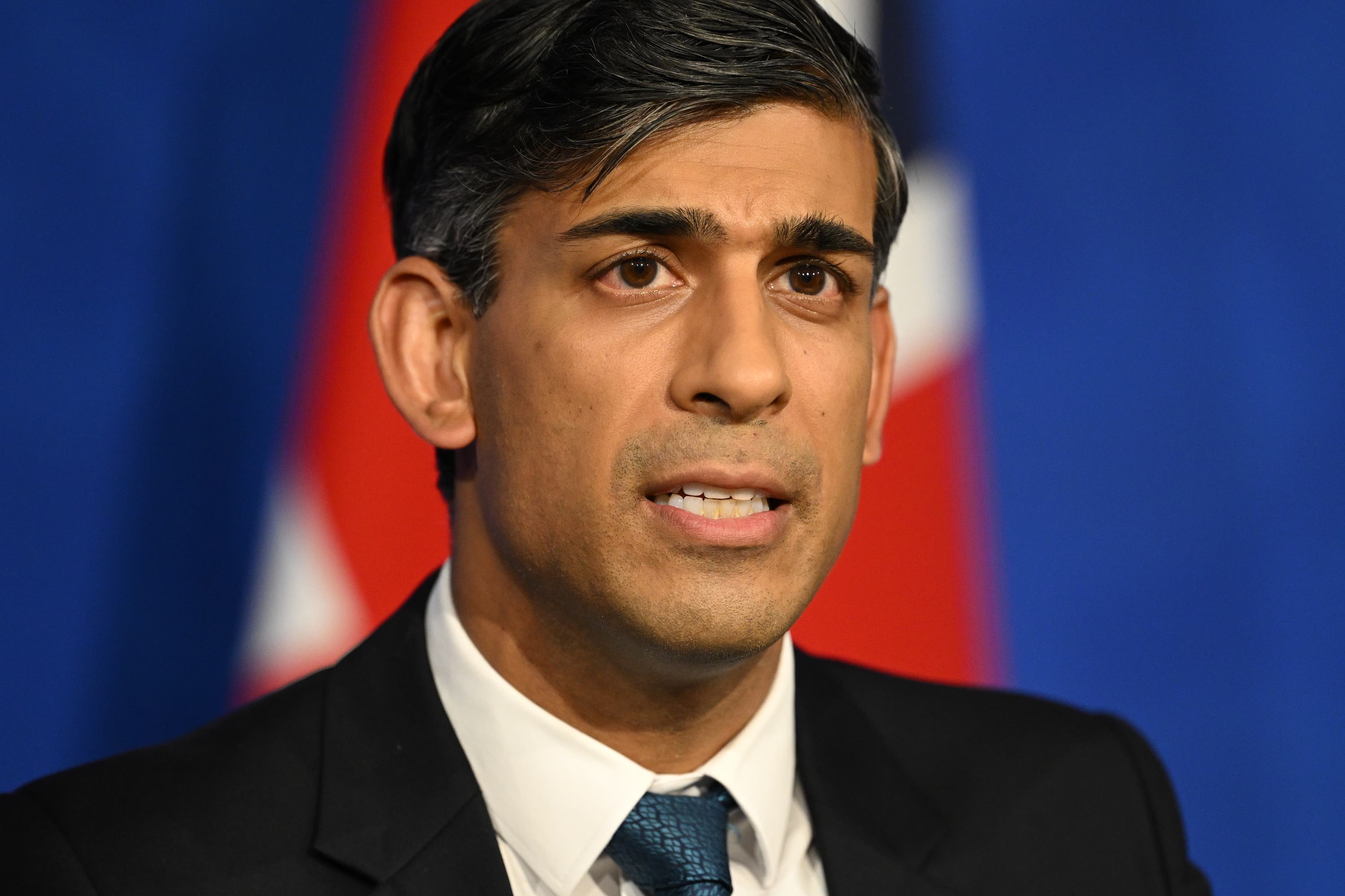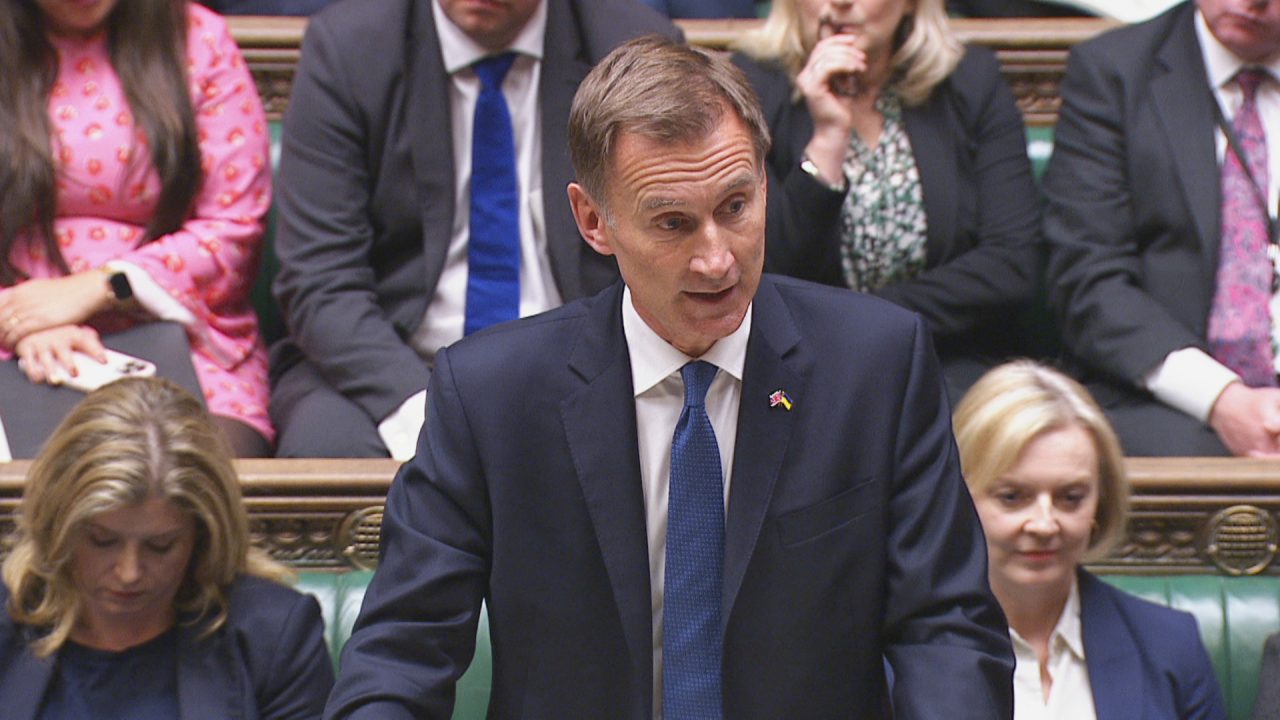Jeremy Hunt is set to unveil tax cuts, measures to boost business investment and a tougher approach to welfare in his autumn statement.
The chancellor will unveil the government’s fiscal plans affecting pay, benefits and pensions at around 12.30pm on Wednesday.
With an eye on next year’s general election, he is predicted to announce tax cuts in a bid to ease Tory anxiety over dire poll ratings.
Changes to national insurance or income tax have reportedly been considered, though nothing has been confirmed.
Rishi Sunak met his self-imposed target of halving inflation in 2023, with the October figure showing the Consumer Prices Index at 4.6%, although that is still more than twice the Bank of England’s goal of 2%.
Hunt has insisted he will be “responsible with the nation’s finances”, but his statement on Wednesday will “focus on how we boost business investment and get people back into work”.
Official figures published on the eve of the chancellor’s statement show that although Government borrowing in October was higher than expected, the year-to-date figure is still below the amount the budget watchdog had forecast.
Prime Minister Sunak has raised expectations that the autumn statement will begin the process of reducing the tax burden, which is the highest for 70 years after the Government was forced to raise money to respond to Covid and the energy price spike triggered by the Ukraine war.
 PA Media
PA MediaIn Scotland, the Scottish Parliament does have some powers over taxation, including setting all rates and bands of income tax, except for personal allowance.
Cuts to public services in England that are devolved in Scotland would see a commensurate cut through the application of the Barnett formula to the Scottish block grant.
What else can we expect?
The Treasury has already signalled a series of measures that will be in the speech, including a £320m plan to help unlock pension fund investment for technology and science schemes, reforms to speed up planning for energy infrastructure and cut bills for those living near pylons, a drive to increase public sector productivity and a new “back to work” agenda to get people off welfare and into jobs.
Welfare
According to The Times, people could see their benefits reduced by £4,680 a year from 2025 as part of a significant tightening of welfare rules.
Laura Trott, the chancellor’s deputy in the Treasury, defended the plans to get people off welfare and into jobs, saying it is the “duty” of those who can work to do so.
The plans could see those with mental health or mobility problems told to search for work which is possible to do from home.
Trott told Sky News: “I think that if you can work, as a principle you should work, and that is what the Government believes. That’s been the thrust of all of our policies.
“Of course, there should be support for people to help them into work or to help them with issues that they’re facing, but ultimately there is a duty on citizens that if they are able to go out to work, that’s what they should do.”
‘Cutting taxes for individuals’ on the table
Bank governor Andrew Bailey has warned it is “much too early” to say inflation has been beaten.
But Trott told Times Radio: “We have turned a corner. Inflation has halved. That is really significant for people at home. We know how tough things have been.
“Real wages are, for three months, now ahead of inflation – again, that’s really important to kind of making a difference to how people feel.
“We can now talk about tax cuts and focus on growth, and that is what we’re going to be doing.”
In a sign that a personal tax cut is on the table, Trott told the BBC’s Today programme the focus is on “cutting taxes for individuals”.
 iStock
iStockONS figures
Figures from the Office for National Statistics (ONS) show public sector net borrowing stood at £14.9bn last month, more than most economists had been pencilling in and higher than the £13.7bn expected by the UK’s fiscal watchdog, the Office for Budget Responsibility (OBR).
But despite the higher-than-forecast figures, financial year-to-date borrowing is still below official forecasts made last March, standing at £98.3bn – £21.9bn more than a year earlier, though less than the £115.2bn forecast by the OBR.
The ONS said borrowing was pushed up in October by uprated benefits and cost of living payments, as well as £1.1bn in interest payable on government debt.
Tories ‘desperately trying to wipe their hands’
Labour said the Tories are to blame for what Sunak has dubbed the “national scandal” of working-age adults not in jobs.
Shadow work and pensions secretary Liz Kendall told Sky News: “It’s very interesting to see Rishi Sunak railing against the fact millions of people are out of work due to long-term sickness, saying it’s a scandal they’ve been written off. Well, who’s done that?
“Being out of work is bad for individuals. It’s bad for businesses, and it’s bad for the economy, but it’s happened under their watch.”
Kendall accused the Government of “desperately trying to wipe their hands for the last 13 years that they are responsible for”.
Follow STV News on WhatsApp
Scan the QR code on your mobile device for all the latest news from around the country


 STV News
STV News

























